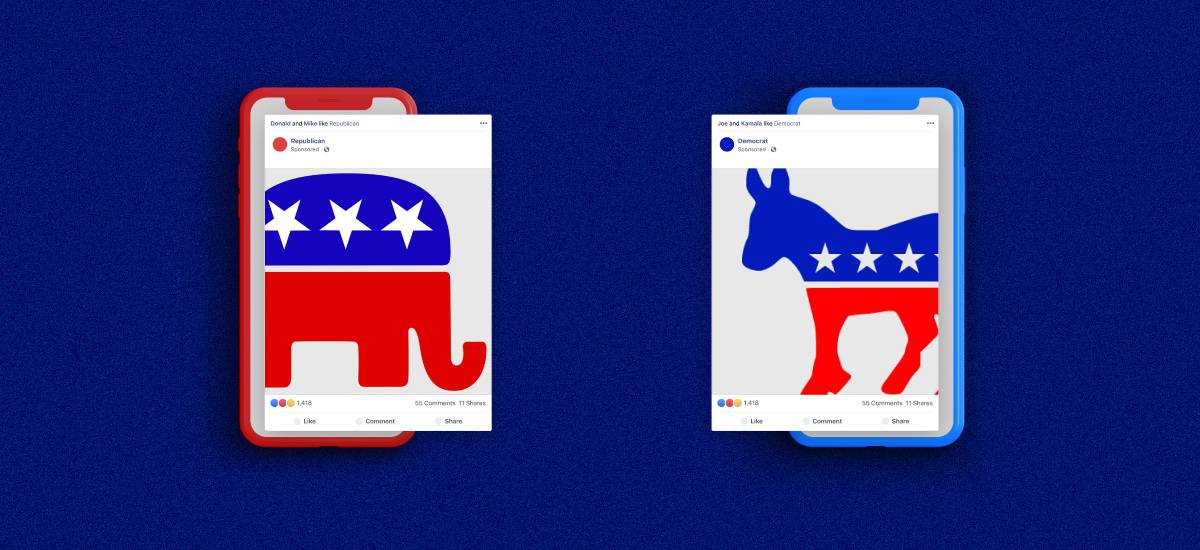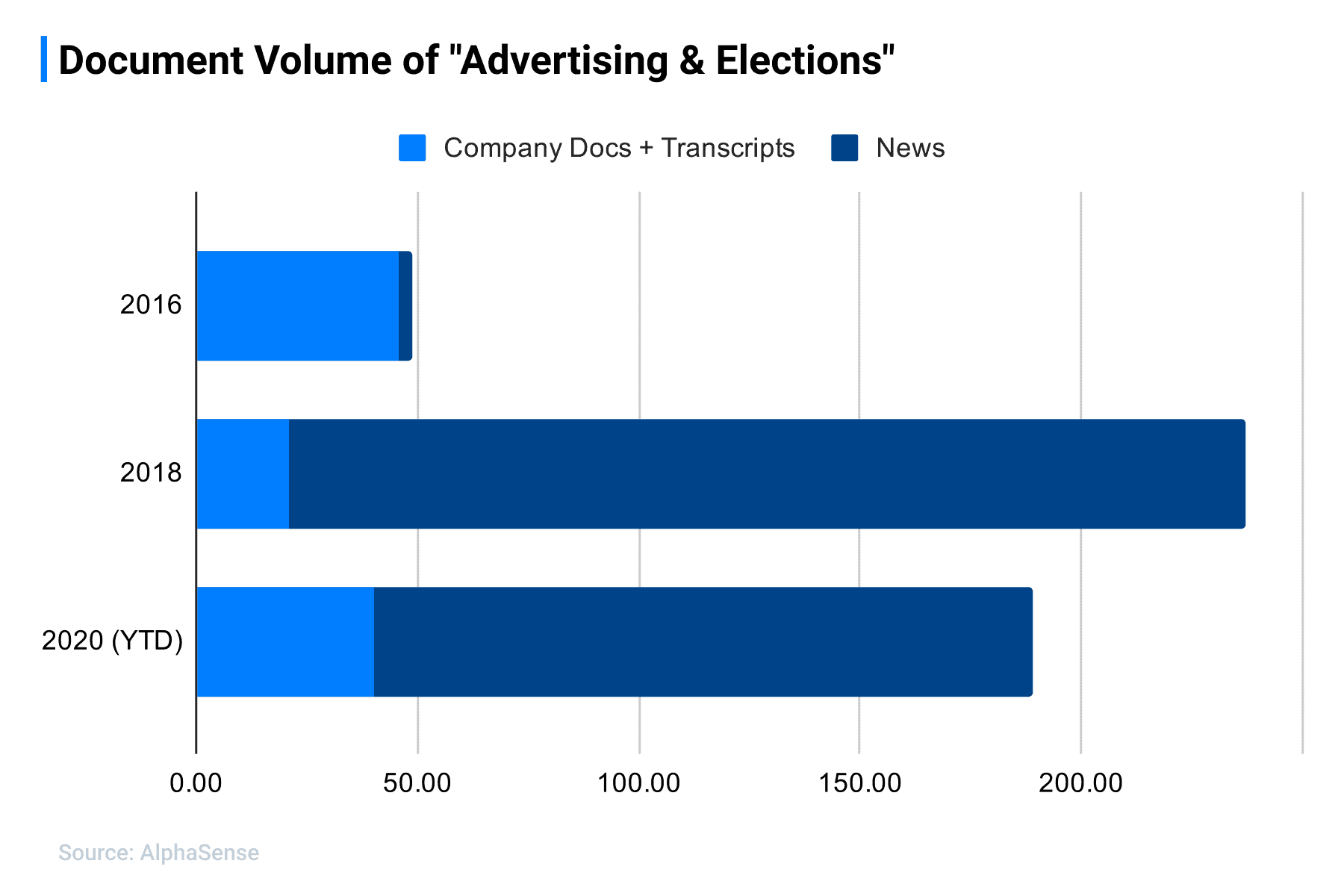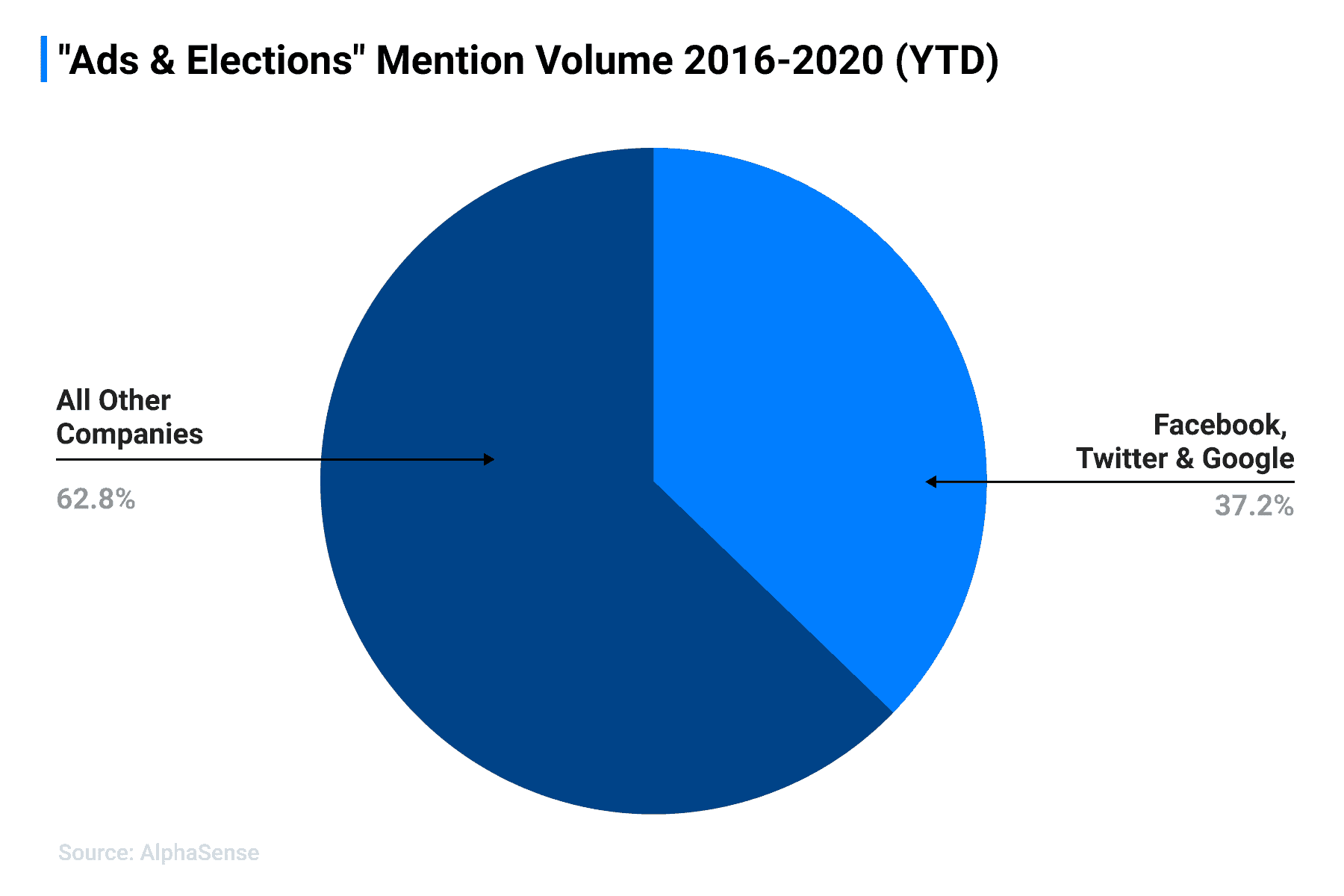With the US presidential election quickly approaching, there has been much discussion around political advertising and the spread of misinformation. While some platforms have taken actions to ban or greatly restrict political advertising, others have been less strict with their stance on the issue. Much of the complexity lies in the fact that the companies themselves are responsible for creating the rulebook — and with an estimated $7 billion being spent on political advertising in the 2020 election cycle, everyone wants a piece of that revenue stream.
Below, we’ve compiled an analysis of how this trend has shifted over time, including a review of specific company policies and how major players are communicating this election cycle.
Takeaways:
- Following a contentious 2016 presidential election, we captured a 7000% increase in press coverage of political advertising (according to AlphaSense data) during the 2018 midterm elections
- This year, the volume of company documents and transcripts referencing political advertising has nearly returned to the previous all-time high of 2016 as companies closely monitor the issue in advance of the election and Q3 earnings
- In 2016, traditional agencies and media conglomerates like WPP and ViacomCBS commented on election advertising most frequently. By 2020, social media platforms and technology companies like Facebook, Twitter and Google dominate recorded mentions
- Facebook recently took action to limit political advertising on its platform for the first time, while platforms including Pinterest, Spotify and LinkedIn committed to not accepting political ads
- From 2016 to 2020, Facebook’s tone surrounding elections shifted from pleased with their progress in gaining ad revenue to serious in their commitment to preventing election interference
We took a look at the last three election years in the U.S. — 2016, 2018, and 2020. In 2018 and 2020, most of the chatter around campaign ads was driven by press coverage, with companies saying relatively little — 9% and 21% of discussion in 2018 and 2020, respectively. In 2016, however, 94% of mentions of campaign advertising and related terms came from company documents, suggesting that press scrutiny of the issue heightened after the 2016 election.
As media attention increased from 2016 to 2020 and more campaign dollars flowed to digital channels, the industries and companies that were commenting on the trend also completely shifted. In 2016, most frequent commenters included traditional agencies and media conglomerates like WPP and CBSViacom. By 2020, the conversation had shifted, as social media platforms and technology companies like Facebook, Twitter and Google dominated mentions. In fact, these three companies have become so influential in political advertising that their materials comprise 37% of all documents in which the topic was discussed from 2016 to 2020.
What are the policies?
Unlike years prior, 2020 has seen some stricter policies implemented by tech companies. For the first time, Facebook has taken action to limit political advertising in the U.S., while Twitter – which does not allow political ads – has stirred up controversy by putting warning labels on tweets by President Trump which it felt broke its rules on spreading misinformation. Google recently joined the conversation, sharing that it would pause political ads on its platforms the day after the general election, and Pinterest took the strongest stance, expressing its commitment to never show political ads on its platform. Below is a full breakdown of company-by-company political advertising policies.
|
Company |
Policy |
Document Volume (2016-present) |
| Will stop accepting new political ads in the week before the election, but will continue to run ads that had already been approved. Will also ban any ads that call into question or delegitimize the results of the election. | 35 | |
| Does not accept political ads. | 46 | |
| Will ban advertisers from running election-related ads on its platforms after polls close on November 3rd. | 22 | |
| Committed to never showing political ads, and said it will not monetize any election related content. | 3 | |
| Hulu | Allows political ads. | 0 |
| Pandora (SiriusXM Holdings) | Allows political ads. | 23 |
| Spotify | Does not accept political ads. | 13 |
| TikTok | Does not accept political ads. | 1 |
| Does not accept political ads. | 3 | |
| SnapChat | Allows political ads. | 11 |
What does Facebook have to say about elections since 2016?
Since 2016, the dominant voice in the conversation around political advertising has been Facebook. Over the past four years, the company has implemented tools intended to crack down on misinformation, created stricter policies around political ads, and even testified in front of Congress on the issue. Below, we’ve compiled select commentary from Facebook’s earnings calls starting in 2016 to present day to uncover the company’s changing tone surrounding elections.
2016
Answer – Sheryl Sandberg: On the political spending, our business is broad based enough that no one event drives our business. We’re pretty large and diversified. While the political campaign, obviously a lot of money is spent in ads. That’s also true of an Olympics. It’s also true of a World Cup. It’s also true of a Superbowl. With all of these events taking place around the world, there’s no one event that we think drives a huge portion of revenue. That said, we are pleased by what’s happened on Facebook for the election cycle. Not just on the paid side but actually on the organic side as well.
We really see Facebook being embraced by politicians all over the world to get in touch with their constituents, and we’re pleased with that. Every member of Congress right now has a Facebook presence, and we’re seeing people like one example is Elise Stefanik, who is the youngest person in the Congress. She made a pledge when she was elected that she would explain every vote she takes, and she explains every vote she takes on Facebook with shorter explanations if they’re not controversial but longer explanations. That’s the kind of mission-based work we’re happy about because it brings people closer to the people who are representing them.
This election season has also driven a lot of conversations, including on Facebook where we’ve made it easier for voters and candidates to communicate with each other. In the first nine months of this year 109 million people on Facebook in the US generated over 5.3 billion posts, comments and likes ands shares related to the election. During the primaries and in September, we also added a register-to-vote link at the top of our Facebook app that we estimate helped more than 2 million people register to vote, some who were registering for the first time. Facebook really is the new townhall. And we’re proud of the role that we’ve played in enabling dialogue and increasing civic engagement. That’s the three-year update.
2017
The first step is doing everything we can to help the U.S. government get a complete picture of what happened. We’ve testified in Congress over the past couple of days about the activity we found in last year’s election. We’re working with Congress on legislation to make advertising more transparent. I think this would be very good if it’s done well.
And even without legislation, we’re already moving forward on our own to bring advertising on Facebook to an even higher standard of transparency than ads on TV or other media. That’s because in traditional media, there’s no way to see all of the messages an advertiser is showing to different audiences. We’re about to start rolling out a tool that lets you see all of the ads a page is running and also an archive of ads political advertisers have run in the past.
We’re also working with other tech companies to help identify and respond to new threats because as we’ve now seen, if there’s a national security threat involving the Internet, it will affect many of the major tech companies. And we’ve announced a number of steps to help keep this kind of interference off our platform.
This is part of a much bigger focus on protecting the security and integrity of our platform and the safety of our community. It goes beyond elections, and it means strengthening all of our systems to prevent abuse and harmful content.
2018
Finally, we’ve started rolling out a major ad transparency effort. We support Congress passing legislation to make all advertising more transparent, but we’re not going to wait for them to act. We’ve already begun launching a way for anyone to view the ads of pages running on Facebook, Instagram and Messenger, even if they aren’t in the intended audience. And we’re testing this in Canada first, with the goal of rolling it out in the U.S. this summer ahead of the midterm election.
This means continuing to invest heavily in safety, security and privacy. Some of this will come in the form of new technology. We’re restricting the data developers can access. We’re building advanced AI tools that have helped us detect and remove tens of thousands of fake accounts ahead of the elections in France, Germany and Alabama last year.
We’re investing more in people. We are doubling our team working on security and content review to more than 20,000 people by the end of this year. And this includes content reviewers with specific language skills to detect hate speech in places like Myanmar.
We’re also working to protect political discourse by making ads more transparent. We recently announced that from now on, we will require everyone running political and issue ads or running a large page to be verified with a government ID. And we’re also starting to roll out ads transparency tools that bring our ads to an even higher standard of transparency than TV or print ads. You’ll be able to see who’s running a political ad, who they’re targeting, how much they’re paying and what other messages they’re sending to different people. And we’re going to get this done in time for the 2018 U.S. midterm as well as upcoming elections in Mexico, Brazil, India, Pakistan and more.
We recently launched 2 important ad transparency tools: one to let anyone see the ads any page is running even if the ads aren’t targeted to you; and the other, an archive of ads with political or issue content that’s starting in the U.S. ready for the midterm elections. These ads are now labeled so you can clearly see who’s paying for them. And within the archive, you can see the budget associated with each ad, how many people saw it and search all ads with political or issue content that an advertiser has run for up to 7 years. This level of transparency will mean increased accountability and responsibility for advertisers globally.
Over the next 18 months, there are important elections beyond the U.S. in Brazil, India and the EU, and these will all be real tests for Facebook. But I’m confident that we will get this right given our results during last year’s French and German elections, the Alabama special election as well as this month’s presidential election in Mexico, where our systems found and removed thousands of fake accounts, pages and groups that had violated our policies. Of course, security is not a problem that you ever fully solve. We face sophisticated well-funded adversaries who are constantly evolving, but during each election, we learn and improve, too.
Our systems for proactively identifying harmful content are improving. Our systems for detecting interference in elections are a lot more mature now. The upcoming elections will be a real test of the protections we’ve put in place. With a community of more than 2 billion people, we will see all the good and bad that humanity can do. And we will never be perfect, but I’m proud of the work that we’re doing here. We’ve reduced the incentives to spread misinformation. We’re partnering more closely with governments and outside experts to improve security, including here in the U.S., and we set new standards for transparency and advertising.
2019
The most important work here is to keep executing our road map to build systems that can proactively identify harmful content so we can act on it sooner. We just finished a year of very heavy investment to get these systems to a better place, and we’ve seen the results of that in recent elections, including the U.S. midterms and in our transparency reports, where we report what percent of violating content we identified proactively. We ended 2018 with more than 30,000 people working on safety and security, up from 10,000 people a couple of years ago. And this work will never be finished, but I now believe we’ve built some of the most advanced systems in the world for dealing with these issues.
We also continue to invest heavily in protecting elections, including more advanced efforts to stop coordinated and inauthentic behavior, new ads transparency tools and more fact-checking partnerships. Our adversaries are continually getting more sophisticated, but recent elections in the EU and India show that our efforts are working. After the recent EU elections, the former President of the EU Parliament said that we met the commitments to fight election interference that I made in my testimony to the EU Parliament, and thanks to our efforts, the elections were much cleaner online. We’ll continue building on these efforts as we approach the 2020 U.S. elections to make sure that we stay ahead.
The other piece I published in the last month was about the 4 areas of Internet regulation I think would be most helpful around content, elections, privacy and data portability. And the reason I wrote this is because I’ve spent most of the last couple of years focused on addressing the important social issues around the Internet. And while I’m proud of the progress we’ve made, these are areas where it doesn’t feel right for a private company to make such important policy decisions by ourselves. If the rules for the Internet were being written from scratch today, I don’t think people would want private companies to be making so many decisions around speech, elections and data privacy without a more robust democratic process. For harmful content, I think there should be a public process for determining what’s allowed and required for keeping harmful content to a minimum. That could be through government or industry, but having common standards is critical since people use so many different services to share content.
For elections, there have long been laws defining what is political advertising, but we need to update those regulations to reflect today’s threats like the ways that foreign nation states try to interfere in elections now. Those threats are often not covered by today’s laws, and I think we’d be better off if companies didn’t define those policies themselves.
2020
Today, I’m going to focus mostly on the new product experiences we’re building. But before I get to that, this is going to be another critical year for making progress on social issues. We’re very focused on election integrity, and this is an area where I’m proud of the progress that we’ve made preventing foreign interference. We were behind in 2016, but after working to protect elections in countries across the world from the EU — in the EU to India to Mexico to the U.S. midterms for the past few years, we think our systems are now more advanced than any other companies’. And we’re often alerting law enforcement and intelligence about threats that we identify. There’s still going to be debate about what kinds of political speech should be allowed, especially as the 2020 elections heat up. But by any objective measure, our efforts in election integrity have made a lot of progress…
When it comes to these important social issues, I don’t think the private companies should be making so many important decisions by themselves. I don’t think that each service should have to individually decide what content or advertising is allowed during elections or what content is harmful overall. There should be a more democratic process for determining these rules and regulations. For these issues, it’s not enough for us to just make principle decisions. The decisions also need to be seen as legitimate and reflecting what the community wants. And that’s why I’ve called for clearer regulation for our industry. And until we get clearer rules or establish other mechanisms of governance, I expect that we and our whole industry will continue to face a very high level of scrutiny.
Politically, COVID has added a heightened level of uncertainty to this year’s elections. Because of the virus, many people may not want to go to the polls in person so voting by mail will be more important than ever. And since many people haven’t voted by mail before, it’s critical that we get official voting information in front of people and help people register to vote. We have built a voting information center, and our goal is to help 4 million Americans register to vote in this election. This will be the largest voting information drive in American history and double the number of people that we helped register in 2016 and 2018. We have already started attaching links to official voting information to any post from political candidates discussing voting. And our goal is to help people register to vote regardless of what these candidates are posting or saying.
We’re also continuing to focus on stopping election interference, including removing voter suppression. We’ve already broadened our policies here and adopted new policies to partner with local election officials to remove false information about voting in the period leading up to the elections, and we are currently considering additional steps that we might take.





